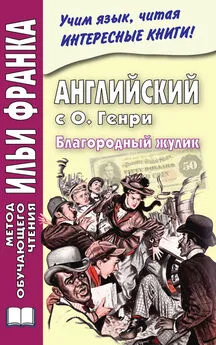Array О. Генри - Смешные рассказы / The Funny Stories
- Название:Смешные рассказы / The Funny Stories
- Автор:
- Жанр:
- Издательство:неизвестно
- Год:2019
- Город:Москва
- ISBN:978-5-17-113947-6
- Рейтинг:
- Избранное:Добавить в избранное
-
Отзывы:
-
Ваша оценка:
Array О. Генри - Смешные рассказы / The Funny Stories краткое содержание
Смешные рассказы / The Funny Stories - читать онлайн бесплатно ознакомительный отрывок
Интервал:
Закладка:
Смешные рассказы / The Funny Stories
© Матвеев С.А., подготовка текста, комментарии, словарь
© Ганненко В.В., подготовка текста, комментарии, словарь
© Прокофьева О.Н., подготовка текста, комментарии, словарь
© ООО «Издательство АСТ», 2019
Вы держите в руках сборник юмористических рассказов на английском языке. В него вошли как признанные шедевры, так и произведения, мало знакомые русскому читателю. Несмотря на то что эти тексты были в значительной степени адаптированы, удалось сохранить авторский стиль, живой язык, и, конечно же, искрометный юмор. Смейтесь от души и совершенствуйте свой английский. А в конце книги вы найдете словарь, который облегчит вам понимание текстов.
Приятного чтения!
A Man of Habit
Jerome K. Jerome
1. Smoking and drinking
There were three of us in the smoke-room of the ship – me, my very good friend, and, in the opposite corner, a shy man, the editor, as we knew out later, of a New York Sunday paper.
My friend and I were talking about habits, good and bad.
“After the first few months,” my friend said, “it is as easy to be a saint as to be a sinner; it becomes a habit.”
“I know,” I interrupted, “it is as easy to jump out of bed early in the morning as to say 'All Right,' and turn over for another five minutes of sleep, when you have got the habit. Not to swear is as easy as to swear, if you make a custom of it. A piece of bread and water is as delicious as champagne, when you got used to its taste. It is only a question of making your choice and getting used it.”
He agreed with me.
“Now take one of my cigars,” he said, pushing his open cigar case to me.
“Thank you,” I replied quickly, “I'm not smoking during this trip.”
“Don't be afraid,” he answered, “It was just an argument. One of these cigars would make you ill for a week.”
I agreed.
“Very well,” he continued. “As you know, I smoke them all day long, and enjoy them. Why? Because that is my habit. Many years ago, when I was a young man, I smoked very expensive Havanas. It was necessary for me to buy cheaper tobacco. I was living in Belgium and one friend showed me these. I don't know what they are made of – probably cabbage leaves soaked in guano [1] soaked in guano – вымоченный в помёте
; they tasted to me like that at first – but they were cheap, they cost me three a penny. I decided to like them, and started with one a day. It was terrible work, I admit, but as I said to myself, nothing could be worse than the Havanas themselves in the beginning. Before the end of the month I could think of them without disgust, at the end of second I could smoke them without discomfort. Now I prefer them to any other brand on the market.”
He leant back and puffed great clouds into the air, filled the small room with a terrible smell.
“Then again,” he continued after a pause, “Take my wine. No, you don't like it.” (my face betrayed me.) “Nobody does, no one I have ever met. Three years ago, when I lived in Hammersmith, we caught two thieves with it. They opened the cupboard, and drank five bottles of it. A policeman found them later, sitting on a doorstep a hundred yards from my house. They were too ill and went to the police station like lambs, because he promised to send the doctor to them the moment they were safe in the cells. Since then I leave a bottle on the table every night.
Well, I like that wine. I drink several glasses, and I feel like I'm a new man. I took it for the same reason that I took the cigars – it was cheap. It is sent from Geneva, and it costs me six shillings a dozen of bottles. How they do it I don't know. I don't want to know.
2. Falling asleep
“I knew one man,” my friend continued, “All day long his wife talked to him, or at him, or of him, and at night he fell asleep to the rising and falling rhythm of what she thought about him. At last she died, and his friends congratulated him, they thought that now he would enjoy peace. But it was the peace of the desert, and the man did not enjoy it. For twenty-two years her voice had filled the house, penetrated through the conservatory, and floated into the garden.
The place was no longer home to him. He missed the fresh morning insult, the long winter evening's reproaches beside the fire. At night he could not sleep. For hours he would lie without sleep.
'Ah!' he cried to himself, 'it is the old story, we never know the value of a thing until we lose it.' He grew ill. The doctors gave him tons of sleeping pills, but all in vain. At last they told him that his life depended on finding another wife.
There were plenty of wives of the type he wanted in the neighbourhood, but the unmarried women were not experienced, and his health was so bad that he did not have the time to train them.
Fortunately, a man died nearby, talked to death by his wife. He called her the day after the funeral and in six months he won her heart.
But she was a poor substitute.
From his favourite seat at the bottom of the garden he could not hear her at all, so he brought his chair into the conservatory. It was all right for him there while she continued to abuse him; but every time he got comfortably settled down with his pipe and his newspaper, she suddenly stopped.
He dropped his paper and sat listening, with a troubled expression.
'Are you there, dear?' he called out after a while.
'Yes, I'm here. Why do you think I am not, you old fool?' she cried back in a tired voice.
His face brightened at the sound of her words. 'Go on, dear,' he answered. 'I'm listening. I like to hear you talk.'
But the poor woman was too exhausted.
At night did her best, but it was a weak performance. After insulting him for three-quarters of an hour, she laid back on the pillow, and wanted to go to sleep. But he shook her gently by the shoulder.
'Yes, dear,' he said, 'you were speaking about Jane, and the way I looked at her during the lunch.'
“It's very strange,” concluded my friend, lighting a fresh cigar, “what men of habit we are.”
The shy man in the corner said: “I can tell you a true story and I bet a dollar you won't believe it.”
“I haven't got a dollar, but I'll bet you half a sovereign,” replied my friend.
So the shy man told his story.
3. The editor's story
“I'm going to tell you about a man from Jefferson,” he began. “He was born in the town, and for forty-seven years he never slept a night outside it. He was a respectable man – a merchant from nine to four, and a religious man in his free time. He said that a good life meant good habits. He got up at seven, had family prayer at seven-thirty, had breakfast at eight, got to his business at nine, had his horse brought to the office at four, and rode for an hour, reached home at five, had a bath and a cup of tea, played with children and read to them till half-past six, dressed and dined at seven, went to the club and played whist till quarter after ten, returned home to evening prayer at ten-thirty, and went to bed at eleven. For twenty-five years he lived that life without any variations. He was used by the local astronomers to check the sun.
One day his business partner in London, an East Indian merchant and an ex-Lord Mayor died, and our man was his only heir. The business was complicated and needed management. He decided to leave his son, a young man of twenty-four, as a manager of his business at Jefferson, and to go to his second family in England, to look after the East Indian business.
He set out from Jefferson City on October the fourth, and arrived in London on the seventeenth. He was ill during the whole trip. After several days in bed he announced his decision to go into the City to see to his business.
On the Thursday morning he got up at one o'clock. His wife told him she did not disturb him, because she thought that the sleep was good to him. He admitted that perhaps it was. He felt very well, and he got up and dressed himself. He said he did not like the idea of beginning his first day without a prayer, and his wife agreed with him. They assembled the servants and the children in the dining-room, and had family prayer at half-past one. After that he had breakfast and set off. He reached the City about three.
Everyone was surprised by his late arrival. He explained the circumstances to his partners and made appointments for the next day, which he planned to start from nine-thirty.
He remained at the office until late, and then went home. For dinner, usually the chief meal of the day, he could eat only a biscuit and some fruit. He was strangely uncomfortable all the evening. He said he supposed he missed his game of whist, and decided to look for a quiet, respectable club. At eleven he went to bed, but could not sleep. He tossed and turned, and turned and tossed, but grew only more and more energetic. A little after midnight he decided to go and wish the children good-night. The opening of the door awoke them, and he was glad. He wrapped them up in the blanket, sat on the edge of the bed, told them religious stories till one o'clock.
Then he kissed them, told them to be good and to go to sleep; and found himself painfully hungry. He went downstairs, where in the kitchen he made a meal of cold pie and cucumber.
He went to bed feeling more peaceful, but still could not sleep, so he lay thinking about his business affairs till five, when he fell asleep.
At one o'clock to the minute [2] to the minute – минута в минуту
he awoke. His wife told him she had made everything to wake him earlier, but in vain. The man was irritated. If he had not been a very good man, I believe he would have sworn. The same repeated as on the Thursday, and again he reached the City at three.
This situation went on for a month. The man fought against himself, but was unable to change himself. Every afternoon at one he awoke. Every night at one he went down into the kitchen for food. Every morning at five he fell asleep.”
4. The end of the editor's story
“He could not understand it, nobody could understand it. His business suffered, and his health grew worse. He seemed to be living upside down [3] upside down – вверх тормашками
. His days didn't have a beginning or end, only the middle. There was no time for exercise or rest. When he began to feel cheerful and sociable [4] cheerful and sociable – радостный и общительный
everybody was asleep.
One day by chance the explanation came. His eldest daughter was preparing her home studies after dinner.
'What time is it now in New York?' she asked.
'New York,' said her father, 'let me see. It's just ten now, and there's a little over four and a half hours' difference. Oh, about half-past five in the afternoon.'
'Then in Jefferson,' said the mother, 'it is earlier, isn't it?'
Читать дальшеИнтервал:
Закладка:










